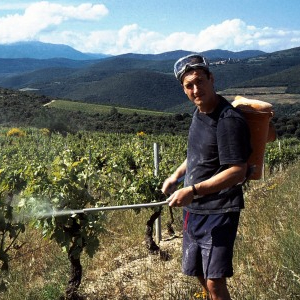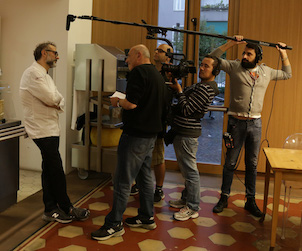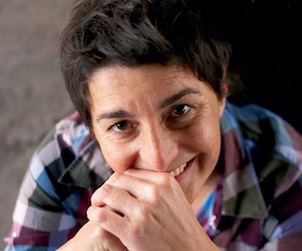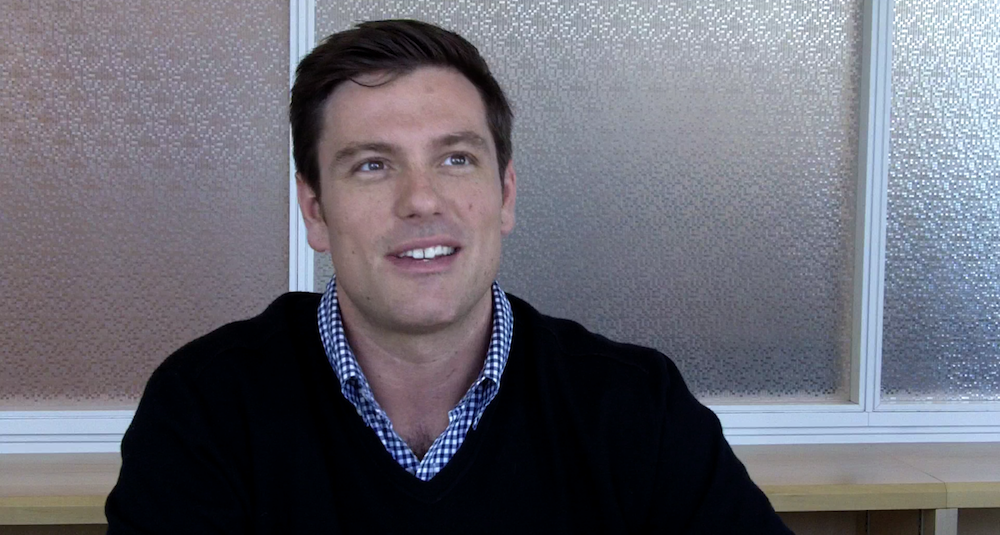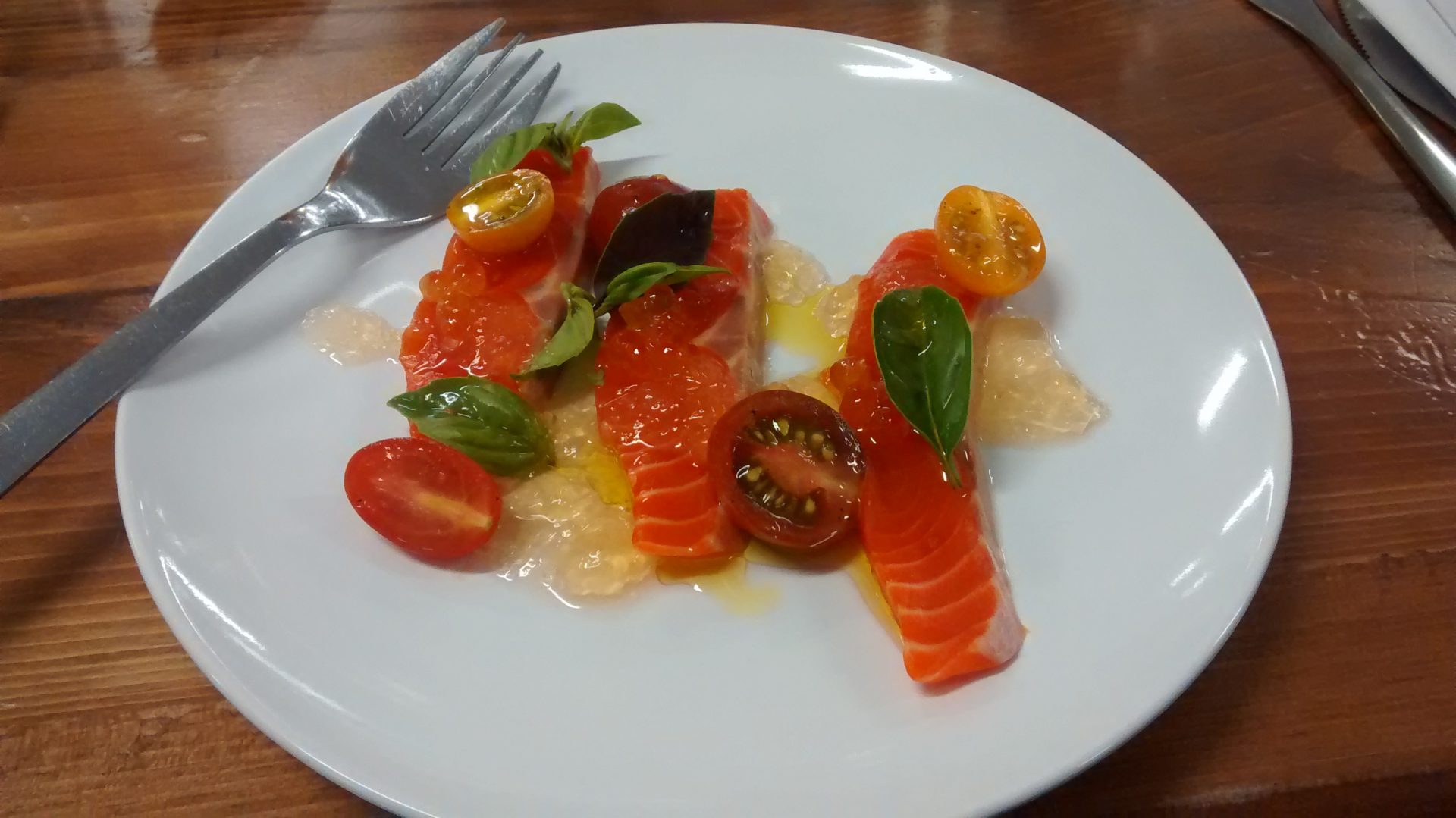By Marlise Ponzo

While attending this year’s Green Living Show’s BioVino event I had the absolute pleasure of interviewing winemaker Monty Waldin. Brilliantly well spoken and extraordinarily passionate about organic and biodynamic viticulture it is no wonder that this very accomplished wine writer, critic and winemaker ended up with his own television series: Chateau Monty. This series was broadcast on the UK’s Channel 4 and followed Monty’s first winemaking endeavor in France’s Roussillon region. Since then he has rented vineyards in other pockets of the winemaking world and continues to make simple, authentic, biodynamic wines that express the terroir of where they are grown and made.
Marlise Ponzo: First and foremost I want to thank you for taking the time to talk to me this morning at The Green Living Show’s BioVino event. I think what initially is so captivating to an audience that is listening to the story of how you ended up where you are today (accomplished wine writer, critic, Biodynamic wine maker and television personality), is the element of absolute fearlessness you have when striving to realize your dreams. Is it true that you funded your first project with your own capital?
Monty Waldin: The way I did it-I didn’t actually buy a vineyard but rented one. I’ve been in the business awhile. I’ve seen what works and what doesn’t work-I don’t need to have a piece of ground. I don’t need to have a Chateau. I realized that I would make less profit doing it that way, by only renting a vineyard but I’d have a much smaller risk. If you buy a vineyard, you sign on the dotted line, then you get a hail storm the next day and you’re in real trouble. If you’re only renting it then you have a little bit of exposure but you can survive. I worked for a guy in Bordeaux when I was a kid, learning about wine. He had all his capital tied up in the Chateau and he didn’t make it. So that taught me a really good lesson early on about capital: if you have a little bit of capital, use it wisely. That’s why I’ve survived, I think.
MP: Can you tell me how you first became interested in the world of wine and where you received your wine education?
MW: In bible school as a kid, I wasn’t very attentive but I was fascinated by bible stories of all of these religious groups always fighting each other.They all seemed to eat olive oil, bread and wine. I thought this kind of vine must be a pretty amazing plant to survive in this type of terribly arid-war torn environment. So I was always fascinated by wine. When I was about fifteen my French wasn’t very good. My French teacher really didn’t like me very much, so she sent me off to France to learn French. I ended up in Bordeaux kind of by luck as well as design and wine was the first thing I was good at. I’ve got a big nose that’s good at wine tasting: so it’s the first thing I felt really comfortable with.
Also, when I was really small I used to go composting with my dad. He was born in 1923 and he would tell me that when the horse cart used to come in the 1930’s, delivering milk, that he would be the first kid out there: not to get the milk but to collect the horse manure with his bucket. The horse manure was great for the tomatoes. So I used to make compost with him. This is a free resource. When I make compost with my dad-it’s full of worms and we put that on our vegetable garden- it makes great food and it costs zero cents. So, the big nose and the compost thing all kind of came together and when I started in wine I was into organic, then later biodynamic. I’m not someone who’s converted [later]: it was absolutely clear to me right from the beginning. When I was in Bordeaux I’d read magazines written by famous authors talking about Terroir (a wine term meaning a wine that tastes of a sense of place) so if a wine comes from gravely soil it tastes rich-if it comes from limestone soil – chalky soil – it will taste firm- and I was like, guys these vineyards have been weed killed to death. A lot of chemicals. How can you talk of terroir, how can you talk of the soil? I was set on my path from a very early age and I’ve stuck to it. One day the wine industry will wake up to the fact that organics is the only way to make interesting wines and wines that are not going to damage our planet.
MP: I think many consumers have some level of confusion regarding the definition of both organic and biodynamic viticulture. Being somewhat of an expert can you clarify these terms for our readers?
MW: There is conventional farming where you’re using man made products such as weed killers, pesticides, fungicides. The attitude of conventional farming is that if there is a problem we nuke it. So when you go to work in the morning to the vineyard that’s your modus operandi. With organics you say let’s try to work a little more with nature. Instead of using a soluble chemical fertilizer you use organic fertilizer. Instead of using a chemical fungicide you use an organic fungicide. Which is fine – there’s nothing wrong with that – it’s a really good system but where I think biodynamic has the edge is that you’re trying to be really self-sustaining. You are trying to transform your vineyard from being a mono-cultural vineyard into a poly-cultural farm. So what does that mean? What’s the difference between a farm and a vineyard? One thing you are going to try to do for example, instead of buying in a bunch of stuff and dumping it on your vineyard, whether it’s a chemical fertilizer or an organic one, you’re going to get yourself some cows. The cows are going to give you some manure and you’re going to compost all of your green waste that you create when you make wine (the skins and seeds). Then, by composting – putting that back onto your vineyard – your wine is much more sustainable because there is no trucking involved and no invoice that has been raised. Your cows have been grazing on your fields from your grass and the manure is an expression of your site and then that manure goes into your grapes which are again an expression of your site- your compost from your site is put back on the vineyard to feed the soil rather than feeding the vine. Your wine stays absolutely an expression of that place where it comes from. It is more sustainable and the wine becomes more original and unique. If I’m on a gravel soil and my neighbor’s on a limestone soil our wine should taste different but if we’re both using the same brand of either chemical fertilizer or organic fertilizer then our wines are going to start tasting the same.
If I’m using my cows in my field with my compost, my wine will absolutely express where it’s come from. That’s probably the key difference between organic and biodynamic. Another difference is that biodynamic farmers work with forces as well as substances. The way plants are grown is shaped by forces, whether it’s a gravitational force pulling the vine down into the earth or the sun force pulling the plant up towards the sky. We think that if the plant expresses itself fully by having a nice deep root system, like a house with a solid foundation, and a very expressive shoot, leaf and grape system, like sturdy walls and a roof – if that vine is expressing itself fully, your wine is going to taste more interesting. In organics you are worried about what is going on beneath your feet like the soil. Biodynamic guys do that but they are also paying attention to what is going on above their heads in terms of the moon and stuff. Sounds a bit crazy but working the moon costs zero dollars. We know that seeds germinate more freely around a full moon; there’s more light, more humidity. The ancient Greeks knew that and they weren’t stupid. We work with lunar cycles. We know that the moon cycle is pretty important in terms of our growth. The female fertility cycle is the same cycle as the moon, same time frame. It is certainly important in terms of plant growth as well. Unless you understand that plants are absolutely linked to those dynamic cycles – that’s where the dynamic part of biodynamic comes in – how can you ever make an expressive wine that is really true to it’s site?

MP: I’ve heard you speak in past interviews about using local plants and teas to treat problems gently in the vineyard and help the vines to heal themselves. Is that a homeopathic approach to viticulture?
MW: Rather than raising an invoice you ask yourself, are there any plants that grow locally that are going to help you reduce your carbon footprint? Chamomile, for example. We drink it when our stomachs are blocked, for abdominal pain. It relaxes you. If you’re a vine and you’re stuck in the ground and it’s really really hot and your sap – which is the blood of the vine – gets blocked just as it does in our own systems, spraying a chamomile tea can actually help unblock the sap. If your plant can’t move its sap around it’s going to get ill. Nettle is great as well. It’s full of silica (sand). If you walk on the beach at mid-day, it’s boiling hot on your feet. Soon as the sun goes down the sand is cold under your toes. So, we know that sand/silica (which is the most abundant mineral left) has a really strong relationship with light. We use a lot of silica in biodynamics. If you have disease issues you have to spray a lot of nettle, which is a great kind of pick me up. It’s full of nutrients, hardening vine foliage, making it much harder for pests and diseases to get in there. Prevention rather than cure. I drink them while I spray them! When I worked in a chemical vineyard you wear a mask, you wear goggles, a protective suit. You do not ingest anything that you’re spraying. So, I love seeing the guys out drinking tea while spraying! Which wine would you rather drink? One that comes from grapes that you can actually eat or one that comes from grapes that you absolutely mustn’t eat?

MP: The organic food industry seems to be growing at an astronomical rate. Consumers and food industry professionals seem more and more educated on the harmful effects of pesticides, fungicides, antibiotics and hormones that chemically treated meat, dairy and produce are riddled with. Do you find a growing public demand for organically, biodynamically produced wine or is there still some discrepancy in demand where the food and wine industries are concerned?
MW: It is in our psyche that all wine is created organically. We know that dairy, meat, fish, all the things that you talked about have been screwed around with but we think that all wine is organic. So, why buy an organic wine? Well listen guys, it’s not all organic and wine is a big, big industry. Grapes [are] one of the biggest fruit crops on the planet and the very active hand of business has a big say in how that fruit is presented to us as consumers. I sell organics on quality. It’s not about saving the planet. That doesn’t really sit well with consumers. It’s not about being holier than thou. It’s purely about quality. The grapes simply taste better. They are usually slightly smaller. They have thicker skins and they have more flavour.
I started writing about biodynamic wine in 1995 and every year since then the number of officially certified vineyards worldwide has grown. There are spurts of growth but over the last few years it is really growing very quickly. It’s about five percent of the world’s vineyards that are now organic. People wouldn’t be converting to organics if there were no market for it. You do have some people who are organic/biodynamic that just don’t state it on the label. They do it because they know they are getting better quality grapes. They don’t need to shout it from the rooftops. They’ve seen it in the grapes: smaller grapes, more concentrated wines, more complex flavours and easier to ferment as well. Fermentation is a natural process: yeast eat sugar, shit alcohol and fart carbon dioxide. That’s what they do, that is the process of fermentation in a nutshell and if you’ve got a grape with pesticide residue on it, the yeast can’t handle that. Then you have to add yeast- powdered fake yeast, basically – and you get all types of problems with fermentation. If you’re not spraying your vines with anything then you get grapes that can naturally ferment. So again, that’s a sign that nature is capable of doing it all on her own. The less man gets involved, the better.
MP: When I have heard you speak of the types of wine that move you, you seem to have a preference for Terroir driven wines, wines of authenticity and simplicity. Showing restraint, elegance, extreme minerality and nuance. I’ve heard you mention German Rieslings, Burgundies, Champagnes and Sherries. How would you define the wine that you make in terms of style, relating to the wines that have inspired you along the way?
MW: I was renting a vineyard in France for a couple years, making dry red wine, dry white wine and dry Rose – all naturally fermented. Some were fermented in barrels, but old used barrels. I didn’t buy any barrels – didn’t cut down any trees. Then, when my partner and I had a baby we moved back to her family home in Tuscany and I made a wine there with, again, no barrels: a simple lunchtime red, basically. I describe my wines as wines that stimulate your appetite. The wines I love wherever they are from- whatever grape variety they are from-are wines that have an inherent freshness. They are wines that are savory and stimulate your appetite. They perk you up. They’re not wines that will send you to sleep. I’m not into big oaky heavy fake wines that have been mucked around with in the winery or had all sorts of stuff added to them because after one glass it will send you to sleep it’s so heavy and just dulls your senses. Those kinds of wines I really don’t like. My wine is all about letting the grapes do the work- letting the soil do the work. I’m not a wine maker: the grapes really just get on with it. These are wines that are uplifting. That’s how I describe it. I’m not looking to make the most complex wine in the world – it’s not about competition. It’s about wines that go well with your food, wines that sit well in your stomach: digestible, simple, that’s it.

MP: I need to state that I absolutely love the way in which you speak about wine. Your honesty and humour make you so magnetic and your practical analogies of your sensory experience are extraordinarily entertaining if not slightly irreverent. Do you find that most people have a really positive response to you or does your honesty stir up some controversy?
MW: I think I probably have done in the past. I went to a wine-producing nation in 2004 and they were claiming to be very green as a nation in terms of wine. I just said ‘you’re not.’ I got really grumpy with them and I pointed out that they were being very contradictory, deceiving their consumers. They said ‘Monty, we don’t need organics. We don’t need people like you here. It’s too expensive and nobody’s asking us about it – bugger off’’ basically. I was back there last week and there’s a huge movement now towards organic and even the guy at the top- president of their wine association said ‘we realize that we can do it- we’re doing it and we’re happy to be doing it. We want more people to move this way because we think that’s the future for our wine industry.’ I think a lot of wine critics kowtow and I think because I’ve had some practical experience from a very young age I can see the contradictions and the BS (If I can say that) in it. I’m not afraid of speaking my mind but I’m not doing it for me. I’m doing it because I just think wine is an amazing, fascinating, fantastic…food. For me, it’s food. It’s not a drink. It’s part of my dining experience: it’s food. I’m not going to eat healthy food and have unhealthy wine and I think every wine producer on the planet is capable of making healthy wine. Every producer on the planet should strive to do that – not only for himself but also for his local community and for his consumers. That’s what I think and I think winegrowers are getting that message and it’s all rosy.
Monty Waldin’s wines are available in Ontario through The Living Vine wine agency: www.thelivingvine.ca or call (647) 519-8609.
 Marlise Ponzo is a Sommelier, Writer, Educator and Consultant based in Toronto. Her Sommelier service,Crushing On Wine, focuses on hosting wine centered events in the private residences and offices of its clients. Crushing On Wine also offers wine list consulting and staff training for restaurateurs who understand the value of a knowledgeable front of house staff.
Marlise Ponzo is a Sommelier, Writer, Educator and Consultant based in Toronto. Her Sommelier service,Crushing On Wine, focuses on hosting wine centered events in the private residences and offices of its clients. Crushing On Wine also offers wine list consulting and staff training for restaurateurs who understand the value of a knowledgeable front of house staff.
Photo: Emma McIntyre

